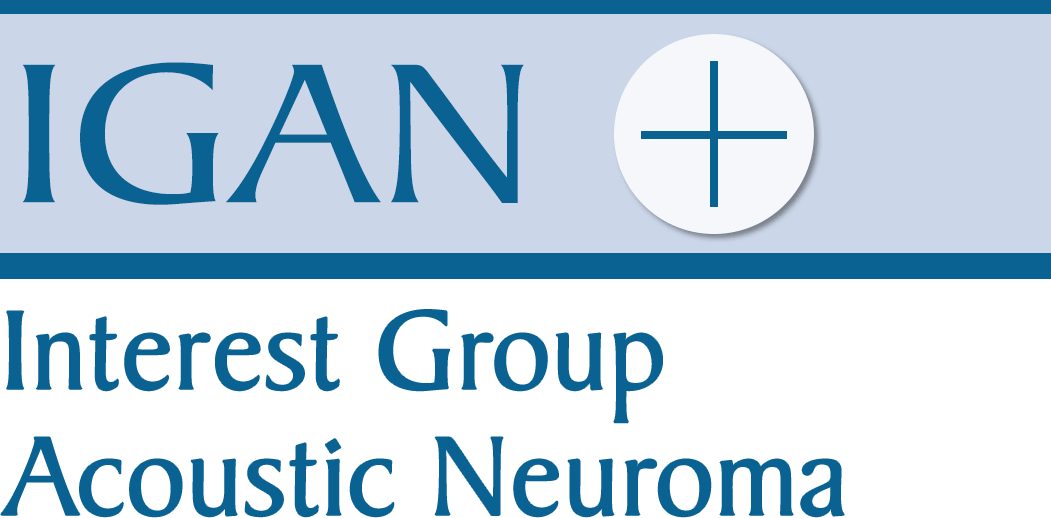Recommendations: General information about acoustic neuroma surgery as a therapy option
Mostly, operations remove acoustic neuromas completely (complete section). Sometimes, however, small residues (residual tumour) are consciously left in order to save other surrounding structures, especially the brainstem, cerebullum and facial nerve. Residual tumours can grow again (relapse), therefore regular MRT monitoring is required. This makes it very clear how important early diagnosis and treatment of tumours are.
Regarding the tumour size, in terms of whether it is favourable to operate or not, there are no limits whatsoever. Acoustic neuromas of all sizes can be operated on. An operation is urgent for tumours with an average diameter of 3 cm and above.
As regards uncertain prognoses of radiation on acoustic neuromas an operation is definitely recommended for younger patients, regardless of the size of the tumour. Another reason for a prompt operation is a sense of hearing that is still intact, as defective hearing cannot be restored through an operation.
For older patients with smaller tumour and severe symptomatic vertigo, an operation likewise presents an effective treatment option, as tinnitus, vertigo and balance symptoms, which exist before the operation, mostly improve or reduce after the tumour has been removed. Although severing the balance nerve during the operation practically always leads to post-operative dizziness, this is only temporary.
An operation can be substituted by alternative radiotherapy if serious internal problems and/or the patient is of an old age and an operation would be too risky.
Time and again acoustic neuroma patients ask about the probability with which the abovementioned, unwanted consequences of an operation appear. This wish is understandable, however it can't be fully satisfied. Even if the statistics state, which many clinics conduct on their acoustic neuroma treatments, or the analysis of medical institutions or PhD students all correspond to the requirements of solid statistics, the individual still has many unanswered questions. There are statements about one larger or smaller average timeframe, yet the development keeps going. The statements contain averages on the different operation situations, easy to solve tumours and those "stuck together". The statement mostly don't differentiate fully the many different starting points before the operation regarding hearing ability, vertigo, tinnitus. In short, you can scarcely deduce how your own operation will go at a specific clinic based on statistics. Therefore, here we do not quote the countless existing analysis and reports on this topic, but rather solely those of Prof. Samii, the undisputedly most prestigious skull base surgeon, who has operated on acoustic neuroma since 1968 and in mid-2007 was able to look back on approx. 3000 operations.
- Mortality for all tumours has been far below 1%, his last 2,500 operations without a fatality.
- 95% retention of the facial nerves with an experienced surgeon, for tumours under 3 cm average diameter 100 % is also possible. 98,5 % of tumours out of his last 200 acoustic neuromas, including ones up to 6 cm, have been completely removed.
- Approximately 50% retention of hearing ability to good hearing ability and up to 70% for small tumours.
- 95% total resection of acoustic neuromas and out of his last 200 98% were totally resectioned (average over all sizes).
In no way are we saying that statistics are worthless; quite the opposite. However, you should not procure so many domestic and statistics from abroad, but rather look at the doctor's statistics that will (potentially) operate on you. And ensure that these are from the last few years. That way you will have a good first impression of the level of the clinic and the doctor. Everything else can be gained for personal contacts and discussions.
Skull base surgery at the highest level
A surgical operation is currently the only therapy which can completely and permanently remove an acoustic brain tumour from the body.
An open operation, and on top of that on/in your head, naturally always involves certain risks. Performed by experienced specialists, supported by a team with just as much experience and the most up-to-date technology, these risks can lessen greatly or even be eliminated, so that an acoustic neuroma operation nowadays is still the first choice.
The advances in medicine and medical technology that have been made over the last two to three decades allow for this optimistic assessment. This includes: modern diagnoses procedures and operation planning (CT and MRT), extensive preliminary examinations before the operation, highly specialised anaesthesia techniques and technology, the use of state of the art operating microscopes and increasingly endoscopes in the last few years, ultrasonic aspirators, which monitor the nerve functions during the operation, use of antibiotics pre and post operation, temporary stay in intensive and recovery rooms, and not least the specialisation of some experts in these operations, combining their high degree of experience and skills. All that rightly takes away a lot of the fear of "brain surgery".
The cornerstones for a successful operation are already laid in the preliminary examinations and carry through to the aftercare.
One aspect warrants special attention: the thorough knowledge from the preliminary examination and the intraoperative observation allows the surgeon to vary and modify his approach during the operation – all to prevent complications and to obtain an optimal result from the operation. This is not possible with other therapies.
